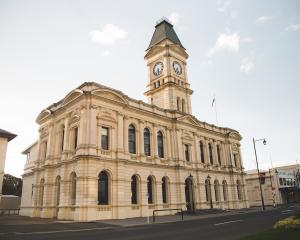Amalgamation of the Waitaki District Council with northern local authorities may be one way to reduce the rates burden on Waitaki ratepayers, Waitaki Mayor Alex Familton has suggested.
The idea of a "super council", which would combine the functions of district and regional councils, was raised by Mr Familton at a public meeting on Thursday night in Oamaru attended by about 60 people to discuss the council's 10-year long-term council community plan (LTCCP).
"Maybe there is scope in the future to do something different.
"We [Waitaki] are a small unit and one of the things we may be able to do is amalgamate," Mr Familton said.
The issue of the rates burden in the Waitaki district, which has a high proportion of low income families, was one issue that arose.
Some people suggested rates were becoming unaffordable.
The Waitaki, Waimate, Mackenzie, Timaru and Ashburton district councils have been investigating the process and cost of forming a central South Island regional council to replace the Christchurch-based Environment Canterbury (ECan) regional council.
However, the issue of a unitary authority is not part of that because the Waimate and Mackenzie districts are reluctant to lose their identities.
Mr Familton, emphasising he was speaking from a personal viewpoint and not from that of the Waitaki council, said forming a new regional council for the central South Island might not be an option under the present Government's policies.
Instead, he would like to see Waitaki, Waimate, Mackenzie and Timaru look at forming a unitary authority - an authority which combines both district and regional council functions - with each of the existing main centres (Oamaru, Waimate, Fairlie and Timaru) retaining their identities.
"One of the best shots we have is to make ourselves a bigger unit and more efficient," Mr Familton said.
Central South Island local authorities were awaiting the outcome of the local government reorganisation in Auckland, where a "super council" is proposed for the city, he said.
Mr Familton also said the council was considering ways in which it could share services and resources with neighbouring district councils to reduce costs.
The meeting was told that one of the reasons why Waitaki's rates were so high was because the district was "unique".
Council chief executive Michael Ross said the district had only about 11,000 ratepayers and they paid for an 1800km roading network, a harbour, foreshore erosion protection and other costs.
He expected some opposition to having a local authority based in Timaru covering the Waitaki district with some loss of local representation.
Issues raised at the meeting included rubbish disposal and recycling, a proposal for a tourism tax, a proposed change in the uniform annual general charge which would have a major impact on businesses and extending the Oamaru central business rating area.












